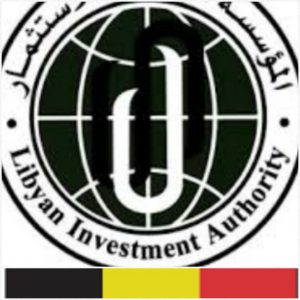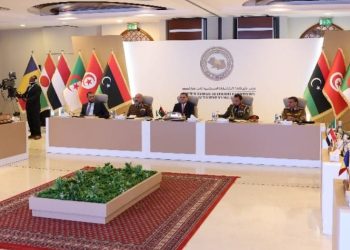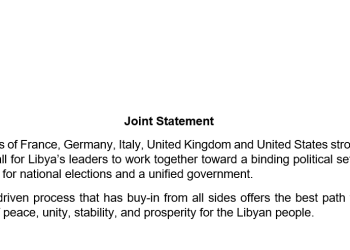By Sami Zaptia.

London, 30 October 2018:
The Belgian government has played a role in financing Libyan militias responsible for trafficking in human beings through frozen Libyan assets, a report by Belgian RTBF radio states.
Yesterday’s report says that according to an anonymous source “close to the secret services”, the role of Belgium has not been neutral in the Libya’s 2011 migration crisis.
The secret service source told the radio report that “For seven years, we have seen that the militia factions have found all the weapons they needed. Some countries have openly armed them, but they have found weapons in other ways. There were one or two scandals linked to planes stopped at (Belgium’s) Ostend Airport with weapons inside. ”
“This is a potential financing of a civil war for 7 years. Civil war that led to a major migratory crisis”, the secret service source added.
It will be recalled that during Libya’s 2011 revolution the UN Security Council froze Libya’s sovereign assets abroad including those in Belgium.
The RTBF report says there are Libyan assets frozen in 4 Belgian banks, namely: BNP Paribas Fortis (€ 43 million), ING (€ 376 million), KBC (€ 869 million) and Euroclear Bank (€ 12.8 billion).
However, the report says that while the main assets were frozen, the interest and dividends accruing from them have not been frozen. It states that from 2012 between 3 to 5 billion euros have left these accounts.
The Belgian radio report says that no one knows exactly what happened to this money,
The report says that Belgian parliamentarians have repeatedly challenged the Belgian government on this issue without success.
“Every time the question is asked to the ministers, there is little answer on the amounts and the reasons. This is a very serious problem, the reputation of Belgium is tainted and pointed to the finger, Belgian Congressman Georges Dallemagne (CHR) is quoted as saying in the radio report.
The radio report says Parliamentarian Georges Gilkinet (Ecolo) believes that the Belgian Government is using the complexity of the dossier not to give information and is retrenched behind decisions taken at European level.
The report points the finger at one particular Belgian politician saying that “A name comes up regularly during our interviews, that of the former Minister of Finance and current Minister of Foreign Affairs: Didier Reynders (MR)”.
“Belgium was obliged to abide by the UN obligation, but in 2011 it agreed to release the interests of these funds. Hundreds of millions of euros have been redistributed and we don’t know where or why. We just know that it was Minister Reynders at the time who had the power of decision”, explained parliamentarian Georges Gilkinet.
In his reply to a parliamentary question from the Belgian MP Georges Gilkinet, Belgium’s Finance Minister justified his government’s decision to release the interest earned on Libyan frozen funds (frozen in Belgium under Regulation (EU) 2016/44) by referring to the opinion issued by the Legal Service of the Council of the European Union at the RELEX Group meeting on 20 October 2011. This obscure opinion is challenged and questioned by Belgian parliamentarian Gilkinet.
However, the final report of the UN Panel of Experts on Libya of 5 September 2018 considered that such payment of interest and other income runs counter to the decision to freeze Libyan assets and to the sanctions regime in general.
The RTBF radio report says that the Libyan frozen assets case is now being looked into by the Belgian investigating magistrate, Michel Clairese.
It will be recalled that in March this year, the Libyan Investment Authority (LIA), Libya’s main sovereign wealth entity, had denied a Belgian media report that Libyan frozen assets had gone missing. Both the Belgian Foreign and Finance Ministers had also refuted the claim at the time.
Belgian weekly, Le Vif, had reported at the time that Belgian authorities had discovered the disappearance of 10 billion euros of frozen Libyan assets held at Euroclear Bank.
The money had allegedly disappeared in the period 2013 to 2017 from four LIA and Libyan Foreign Investment Company (LAFICO) bank accounts. As of 29 Nov 2013, these accounts had held more than 16 billion euros.
The Le Vif report had claimed that in the autumn of 2017 it became clear that the accounts held just five billion euros.
They were only discovered to be missing, the report had said, when Belgian judicial authorities reportedly noticed that money went missing in 2017. An investigating magistrate had wanted to seize the frozen funds as part of a probe into alleged money laundering by Qaddafi’s inner circle.
Despite the LIA refuting that any of its assets were missing, Le Vif still stood by its claim.
Moreover, in April 2018 the LIA issued a full statement assuring of the safety of all its Belgian-based assets.
It had said that all its assets based in Belgium had not been compromised by any party and that they were under the close scrutiny of its board of directors.
The LIA’s chairman, Ali Mahmoud was quoted by the Presidency Council’s Media Department as saying that the LIA had ‘‘a meeting with Belgian Ministry of Finance officials who confirmed their commitment to the UN Security Council resolution” freezing all Libyan assets abroad during the 2011 revolution.
And that ‘‘The (UNSC asset freeze) was not breached by any state and (any) financial transactions were carried out in accordance with international standards’’.
https://www.libyaherald.com/2018/04/03/lia-assures-of-safety-of-all-its-belgian-based-assets/
https://www.libyaherald.com/2018/03/10/lia-and-belgian-authorities-deny-loss-of-belgian-based-libyan-funds/










